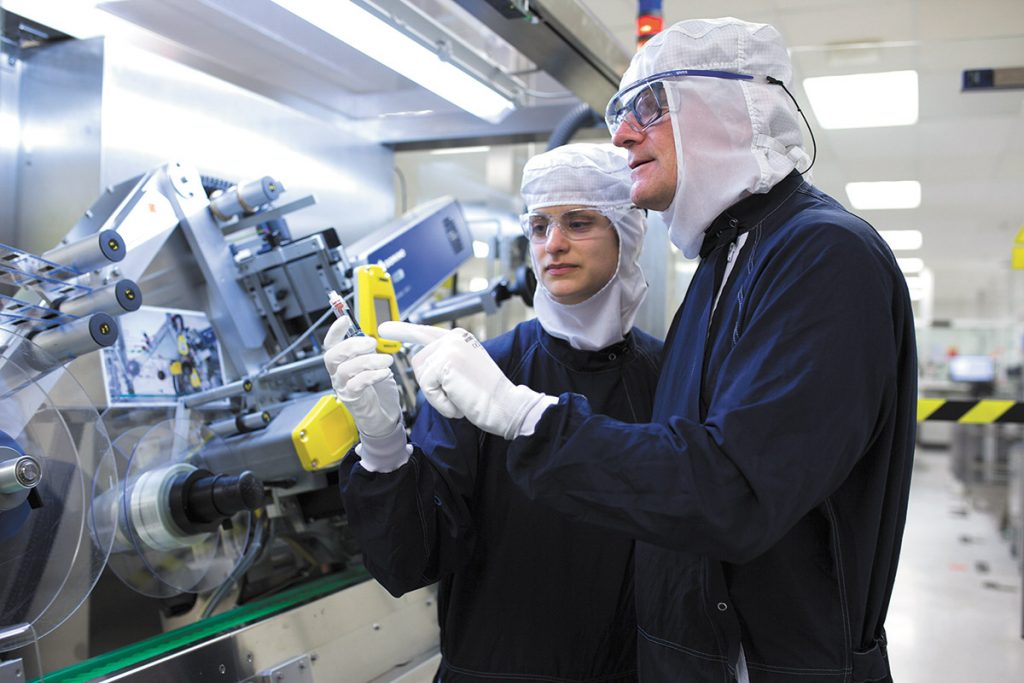Subscriber Benefit
As a subscriber you can listen to articles at work, in the car, or while you work out. Subscribe NowEli Lilly and Co. is warning investors that its business could take a hit from a wide variety of negative factors stemming from the COVID-19 pandemic.
The Indianapolis drugmaker issued the warning on a conference call Thursday morning after releasing strong results for the first quarter, saying that things could get sticky later this year.
The negative pressures include rising unemployment, a likely decrease in new prescriptions as a result of fewer patients visiting physicians’ offices, and downward pricing pressure from government health care systems around the world.
“While we do not yet know the extent and duration of these impacts, like everyone around the world, we’re hopeful that the massive mobilization of scientific and technical resources occurring across this industry, and in collaboration with government and academic labs, will yield multiple effective therapies in the coming months and an effective vaccine in 2021,” CEO Dave Ricks said on the conference call.
The sobering message came after Lilly said first-quarter profit soared 29%, excluding one-time expenses, as customers filled more prescriptions, primarily for diabetes medicines, apparently due to widespread anxiety about the supply of medicine drying up.
Despite the warnings, Lilly raised its full-year profit guidance to a range of $6.20 to $6.40 on a reported basis and $6.70 to $6.90 on a non-GAAP basis—up from a range of $5.75 to $5.85 a share.
Shares in Lilly rose 2% in midmorning trading, to $159.79 each, up $3.07.
Among the cautions that Lilly officials mentioned were increased unemployment in the U.S. which could result in a shift to patients from commercial insurance to government insurance, which is less profitable for Lilly, or to patients being uninsured.
“We’re monitoring this dynamic closely, and while it could create headwinds in the near term, this effect should lessen when the global economy eventually strengthens,” said Josh Smiley, Lilly chief financial officer.
The company said it expects the “most pronounced impact” on new prescriptions to occur in the second quarter, but other headwinds are likely to show up in the second half of the year as inventory levels normalize and the company feels the compounding effect of fewer new prescriptions.
In the meantime, Lilly officials said they are moving quickly to develop treatments to fight COVID-19, with three separate programs. That is taking place as drugmakers around the world are racing to find treatments for the disease that has taken the lives of more than 185,000 people worldwide, including more than 47,000 Americans.
“We’re moving at an unprecedented pace as part of an industry-wide effort to develop a treatment for COVID-19,” said Dr. Daniel Skrovonsky, president of Lilly Research Labs.
Perhaps the most significant Lilly program is an antibody therapy for potential treatment and prevention of the disease, in collaboration with Canadian biotech AbCellera. Their scientists are working to characterize virus-neutralizing antibodies obtained from one of the first U.S. patients that recovered from the virus. Lilly said it plans to apply to the Food and Drug Administration by the end of May to allow the start of clinical testing in patients.
The drugmaker is also in mid-stage clinical trials of an antibody in pneumonia patients hospitalized with COVID-19 who are at a higher risk of progressing to acute respiratory distress syndrome. The trial is testing whether the antibody can reduce the progression of the disease or the need for mechanical ventilation. Lilly said it expect results from the trial in the coming months.
Last, Lilly is testing an approved arthritis drug, baricitinib, to see whether its properties in reducing inflammation can also attack the virus. However, baricitinib, also known under the brand name Olumiant, is a fairly restricted drug in the United States due to its safety profile.
The FDA approved the drug in 2018, but cited safety risks of infections, malignancies and blood clotting. It said Lilly could only sell a low-dose version, reducing the number of patients eligible for the treatment. And the drug was slapped with a black box warning, the strictest labeling of prescription drugs.
Please enable JavaScript to view this content.

